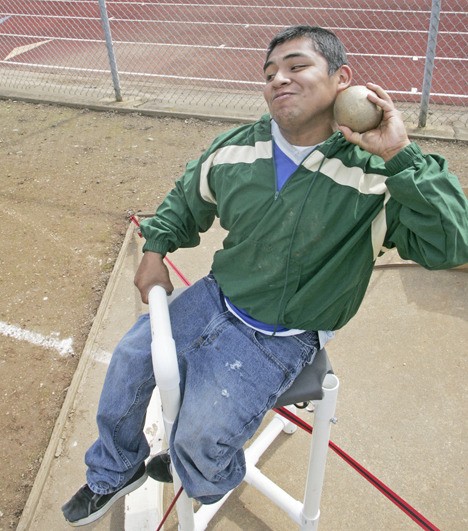Alfredo “Juan” Figueroa hoists a 12-pound shot to his ear.
Like any good thrower, Figueroa lifts the shot to his ear, body twisting as he releases, the shot bounding into the dirt just shy of the 10-feet mark.
“You’re hitting pr’s (personal records) with every throw,” Auburn track and field teammate Nick Conlan says.
Figueroa smiles, adjusts in the fabricated PVC tube throwing chair he is perched upon and hoists the shot again.
“For Jose, he’s got basically the same form as the other guys, except he can’t use his lower body,” Auburn throwing coach Dan Irwin says, as Figueroa throws again and again, sometimes switching from the shot to the discus.
“But it’s all upper body, and he is really strong,” Irwin concludes.
For Figueroa, who was born 17-years ago with cerebral palsy, just being able to walk with the aid of crutches is a testament to his hard work. The fact that he is currently at the top of the shot put and discus rankings for disabled athletes in Washington State after just one meet just further illustrates his dedication and determination.
“He’s one of the hardest working students I’ve ever worked with in physical therapy,” district physical therapist Matt Hansen says.
Initially, Figueroa, a junior at Auburn High School, was told he would never leave a wheelchair.
Refusing to become a slave to his disability, a brain disorder which affects his muscle tone, forcing them to tighten up and become hard to stretch, Figueroa threw off the constraints of the chair in the fifth grade.
“I was told I wasn’t going to leave a wheelchair, and now I’m on crutches,” Figueroa says. “I went from the chair to a walker to crutches. They say it’s a short time. For me, I thought it took a long time. Some people take 10 years to get from a wheelchair to a walker, and I did it in about four. But I’m not a whiner, my parents raised me like a normal kid, so I’m not a whiner. Except for doing chores.”
The whole throwing thing began last year, when Figueroa and Hansen stumbled upon the opportunity for him, and other disabled athletes, to represent the school athletically.
“Alfredo is a great advocate for himself, and last year we talked about some of the things he could do to get himself more involved,” Hansen says. “So we were trying to think of different ways for him to do that.”
Hansen adds that he was attending a clinic hosted by Seattle Adaptive Sports when he first saw the throwing chair, which allows athletes to sit while they toss the shot and discus.
“They had some commercial chairs up there, made of metal,” Hansen says. “But they were pretty pricey, running about $500 and up.”
Among the more costly commercial chairs, however, was one made of PVC pipe.
“I asked this guy if I could take pictures and measurements,” Hansen says. “So that’s what I did, and we fabricated one here in the shop. So we did that and put it together and here we are.”
This week, Figueroa and teammate Jasmine Shepherd will compete at the South Puget Sound League 4A track and field meet, looking to punch their ticket to the district meet and hopefully the state meet later this month.
Currently, track and field is the only outlet available to disabled high school athletes in Washington State.
For Figueroa, however, it was almost an opportunity lost.
After all the planning and preparation to begin competing this season, Figueroa was hit by a car in January as he waited for a bus before school.
“He’s not sure how it happened or where the car came from,” Hansen says.
“Luckily, he was thrown up and over and not underneath.”
The accident was serious enough for a trip to the hospital, but Figueroa didn’t stay long.
“I’m not that kind of person to go to the hospital,” he says. “I got hit by the car, I got checked out and came back to school.”
The incident did require him to wait for clearance from a doctor to compete, however, putting the kibosh on starting practice with the chair at the beginning of the season. And with 10 practices required to compete, Figueroa found himself having to work extra hard to catch up and qualify.
Figueroa says he practices throwing every day from 3 to 4 p.m., in addition to doing physical therapy for a couple of hours a day and working out, where he benches 180 pounds, not bad for someone who weighs just 138.
Hansen says the improvement that he has seen in Figueroa, physically and mentally, has been mind boggling.
“He couldn’t lift the bar a couple of years ago because he had so much tone in one of his shoulders,” he says. “His right side is a lot stiffer than his left. So when he tried to lift the bar (it would slant).”
Figueroa credits the inspiration of his Trojan teammates, including Conlan and Danny Shelton.
“They really are an inspiration,” Figueroa says of his teammates. “Some of these guys are monsters, they really throw a long way. The other guys help a lot.”
Figueroa says the interaction with other athletes has also helped with his goal of turning his life around.
“I have to turn around my life,” he says. “I have to get more involved in school. Since I’ve been on the team I’m more involved, and I have a lot more friends now. I was kind of a troublemaker. I wasn’t super bad, but I didn’t really care about school.”
Now, he hopes to graduate from high school and hopefully move on to college. He would like to study the law and become a lawyer.
“I’m just trying to become a functioning member of society, not a handicapped member of society, but a functioning member,” Figueroa says.


